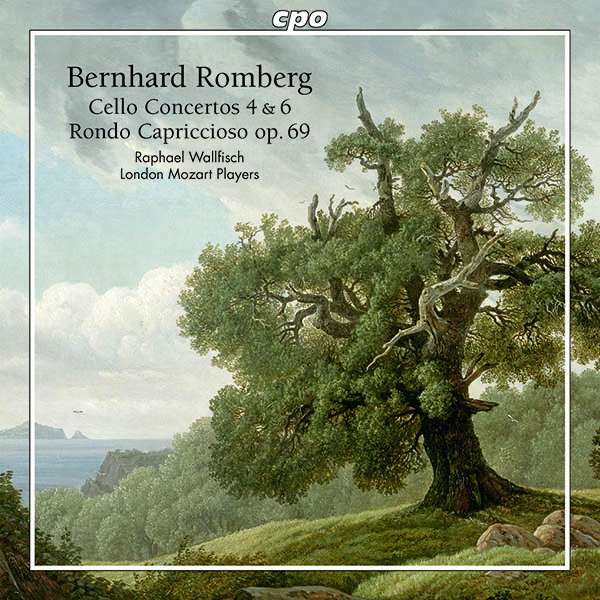Bernhard Romberg (1767-1841), laut einer zeitgenössischen Publikation « einer der trefflichsten Komponisten und als der vollkommenste aller jetzt lebenden Cellisten », hat sein 4. Cellokonzert 1803 in Paris komponiert. Es gehört zu seinen beliebtesten Kompositionen. Es ist einfallsreich und enthält viele gute und aussagekräftige Ideen. Es ist erstaunlich, dass dieses Konzert noch nicht aufgenommen wurde. Sein sechstes, in der Anlage viel kräftigeres Konzert mit dem Beinamen Concerto militaire wurde 1812 in St. Petersburg komponiert.
Raphael Wallfisch spielt elegant und lässt vor allem die langsamen Sätze bedeutungsvoll werden. In ihnen spielt er ausdrucksvoll, was ihm in den Ecksätzen nicht so überzeugend gelingt. Vielleicht hat ihn die Doppelrolle als Dirigent und Solist doch zu sehr vom Wesentlichen abgelenkt. Die London Mozart Players spielen selten mehr als akkurat.
Beide Konzerte hätten meinem Empfinden nach insgesamt rhetorischer und charakteristischer aufgeführt werden könne. Auch ist Wallfischs Intonation nicht immer auf bestem Niveau.
Sehr gefällig erklingt am Schluss das Rondo Capriccioso für Cello und Streichquartett, aber das kann die leichte Enttäuschung über diese vertane Chance, wirklich packende Interpretationen der beiden wunderbaren Cellokonzerte zu bekommen, nicht verhindern.
Bernhard Romberg (1767-1841), according to a contemporary publication « one of the most accomplished composers and considered the most perfect of all cellists now living, » composed his 4th Cello Concerto in Paris in 1803. It is among his most popular compositions. It is imaginative and contains many good and meaningful ideas. It is surprising that this concerto has not yet been recorded. His sixth concerto, much more vigorous and nicknamed Concerto militaire, was composed in St. Petersburg in 1812.
Raphael Wallfisch plays elegantly and makes the slow movements especially meaningful. In them he plays expressively, which he does not manage so convincingly in the outer movements. Perhaps the double role of conductor and soloist distracted him too much from the essentials. The London Mozart Players rarely play more than accurately.
Both concertos could, to my mind, have been performed more rhetorically and characteristically overall. Also, Wallfisch’s intonation is not always at the best level.
The Rondo Capriccioso for cello and string quartet sounds very pleasing at the end, but that cannot prevent the slight disappointment about this missed chance to get really gripping interpretations of the two wonderful cello concertos.





















